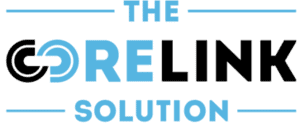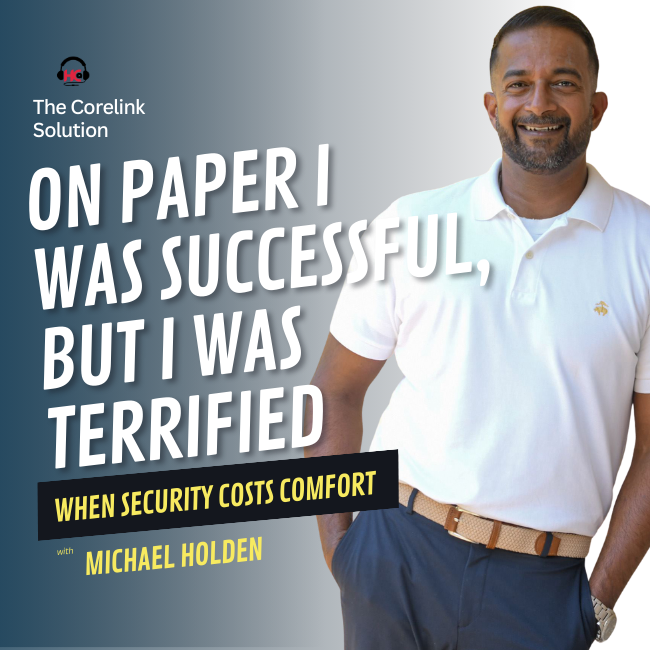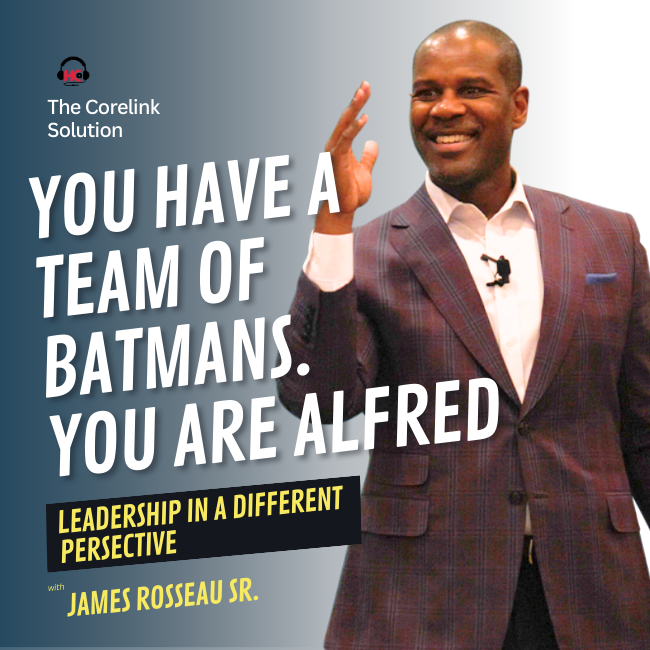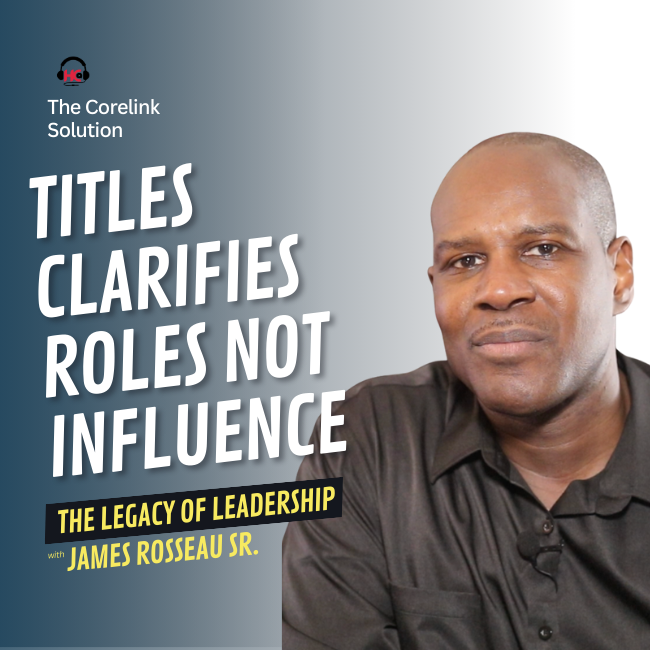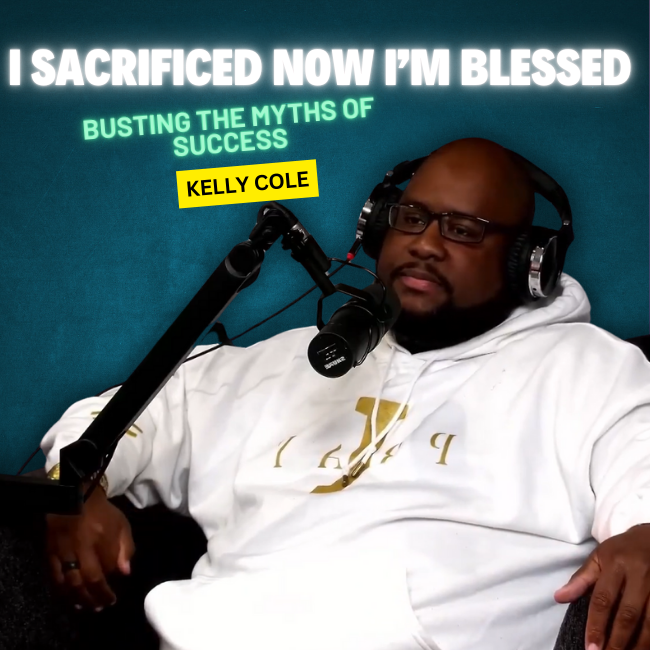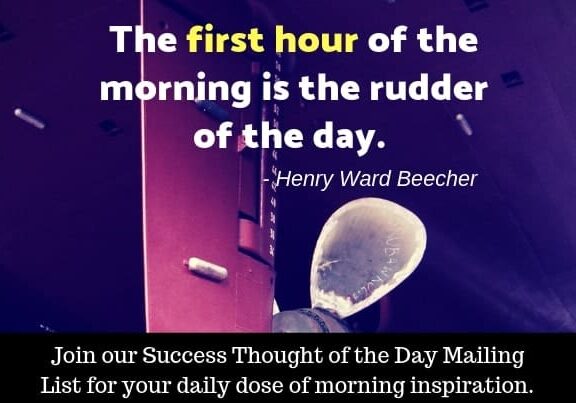Episode 59: The Power Of Intention: Building Capabilities to Transform Your Story
Subscribe: iTunes | IHeartRadio | Spotify | Stitcher
Video Excerpts below. Listen in full at the links above.
Drive towards success with more predictability by shifting your focus from outcomes alone to what you truly want and consistent behaviors. Dr. Ian Brooks joins me to share his model for how to do that and achieve transformation.
About Dr. Ian Brooks
Dr. Ian D. Brooks, the CEO and founder of Rhodes Smith Consulting and Author of Intention: Building Capabilities to Transform Your Story. He works with leaders in organizations to develop key skills in navigating within their organization and working with their teams. He also helps individuals build skills toward achieving their tomorrow and helping them master their intentions.
Visit Dr. Ian Brooks
https://www.facebook.com/ian.brooks.501
https://twitter.com/DrB_Intention
Full Transcript
James: [00:00:00]
Welcome to another episode of The Corelink Solution where we empower you with awareness and actionable insights. Think about what you could accomplish if you did so with intention and think about what those success stories might look like If you have more intent.
Introduction
James: I am Welcoming today Dr Ian D Brooks the CEO and founder of Rhodes Smith Consulting and author of Intention: Building capabilities to transform your story. Dr Ian works with leaders and organizations develop key skills in navigating within their organization and working with their teams. Please join me in welcoming Dr Ian Brooks to The Corelink solution.
Welcome
Ian Brooks: No. Thank you, Dave.
James: I’m so glad you could make it. So I am one who likes to hone-in on intention so this topic is near and dear to my heart and I’m looking forward to it. But before we [00:01:00] launch in, let’s give everybody an opportunity to get to know you a little bit. It’s a question I love to ask What’s one thing you can share with us that even those who believe they know you best don’t know about Dr Ian Brooks
Ian Brooks: Yeah. For those who don’t know me very well, I’m a pretty quiet person. Don’t like the spotlight. Don’t enjoy being out in front. And, one of the things that this book has afforded me a chance to do, and speaking with you and others is to step out from behind the curtain, if you will, and have my voice heard in a lot different perspectives than, I was allowing it or affording myself a chance to do not only is this book from mint within the realm of my coaching and what I experienced with others, but it’s also an opportunity for me to work with intention on the day-to-day basis to be, have some purpose. And so now stepping out in front of this light and having this conversation, is that an example.
James: Yeah yeah. So you’re living out some of the [00:02:00] elements of your book just going through this process.
Ian Brooks: Absolutely I am not only the author, but also a client myself. And I tell you there’s some prominent pieces I actually talk about in the book that really reflect that. Most notably that the version of the book that has been launched as of April is a second copy. As I did not enjoy. Or, did not appreciate my first copy to the extent that I wasn’t my authentic self and I wasn’t writing in a way really enabled readers to actually experience the book the same way that I had.
I scrapped it all that very first version. I had a choice to make at that moment to either write the book that was an authentic book. One that really authored in my voice, or I could scrap the whole thing and just say it was a nice exercise. And as six months after that decision the book was finished.
I tell you that experience afforded me to become the author the book needed me to be, and as such, I’m happier with this version [00:03:00] obviously subsequently.
James: What an interesting story So the the acknowledgement that the the first version wasn’t where you wanted it to be but then I’m pushing taking that acknowledgement to action of saying I’m going to pull that one in Do another version how has that interaction with the publisher If I can ask?
Ian Brooks: Yeah, it was pretty good since I’m an independent publisher.
now my choice, but one of the things that it afforded me a chance to do, because it was a written copy, as well as the audio book that I was actually executing at the time as well. So going back and forth with the producers around the edits that they had made.
But there are certain things. Quite notably that the editor editorial process could not change. It really came down to my content con came down to even the confidence of which I was speaking book were choice of which they couldn’t correct. And as such, I needed to be my own coach and a lot of information that I pulled out from myself going through that experience, both [00:04:00] from a knowledge perspective, but even that emotional.
A drain that it took actually to even hear my voice and acted to go back and re audit everything that I heard really afforded me a again, a chance to come to the book of the fresh lens and saying, wow, I’ve now experienced this in a way I’d never thought. And as much as I’m writing this book for me, as well as, and more importantly, for the clients of whom I was working
James: Like I said I’m a fan of the concept being intent on what you want to do.
What led you to writing this book
Ian Brooks: Sure. It’s my book was written based on my experience from my clients and their struggles to know how to effectively change. generally speaking, I think people try to minimize the discomfort associated with changes that they experience. And I wanted to write a book that really afforded an opportunity that people experienced transformations in an authentic way as they’re going through their own journeys.
So at the beginning, I started writing the book in the context. Jotting down notes from different conversations. I had looked my clients from a coaching [00:05:00] experience standpoint, where did I see them con consistently struggling to actually answer questions or where do I find myself consistently reinforcing certain topics?
From that it led me to capturing certain things. From various conversations and experiences that truly resonated in once that I wanted to make sure I reinforce in a broader scheme of things. This also this idea of intention also was pulling from my own personal journey. As a child I was as a 13 year old knew I wanted to get into the field of psychology, a field born by active listening and not necessarily being out in the forefront.
James: Yeah That is an old saying I’m probably going to get it a little bit wrong but something along the lines of it The pathway to hell is paved with good intentions right No I and I think the takeaway from that is we can have wonderful intentions but does it change the outcomes Does it change us actually getting things done in the way we want to get them done? What would just to start there what would you offer in [00:06:00] terms of what you’ve seen when people are very clear about their intentions?
Ian Brooks: Yeah, I think one of the things that they’re clear about and is around the end point they’re clear about where they want to go. I think what we get often caught up in that pathway. Is paved with good intentions is that we think that path is straight. We haven’t necessarily built our capabilities to deal with the ebbs and flows, both of how we think what our behaviors are and even how to emotionally manage through our changes.
Thus, when we’re going down that pathway, we think it’s straight. It’s quite frankly, it’s a zigzag sometimes going forward. Sometimes we’re going backwards. And how are we coping through those ebbs and flows of those of that path. We’re going down realizing that our end point is nothing more than a mile milestone, but the true art of any transformation starts with our belief in our capabilities, but also building that strength throughout [00:07:00] and more specifically that strength being our behaviors on what’s going to carry us forward through those ebbs and flows, recognizing that our milestones will change with or without our own permission.
James: That’s good That’s good So now before we jump into some of the process of intention for the analytically inclined That that are watching and listening what would you say in terms of anything you could offer in terms of the increased level of success when being intent about what they want to accomplish what would you how would you respond to that
Ian Brooks: Sure I know for the analytically inclined hits you can tie them to your increase your success rate if you will, just working intently. Now let me be clear on what I’m defining as success as we have, quite obviously mired definition of what success looks and feels like, especially as we’re changing our behaviors, oftentimes we’re defining success defined by receipt of a job title or new job or marriage or some type of end [00:08:00] result.
We boxed ourselves into an idea of what that finish line looks like. And as the saying goes when you hear the details of success, it’s hard to distinguish it from defeat. And in that respect, when we don’t achieve that title or that end point or that tangible objective milestone, we see and view ourselves as being less than.
So when I’m defining tenfold of success, really defining it based off behaviors and the consistency of behaviors, because now the consistency of behaviors lends itself towards it’s the forefront of our mind. It’s now we’re paying attention to it with purpose and consciously, and we’re doing that across different situations and different scenarios and with different people.
So success for me is defined. Tenfold through the consistency of that behavior and making sure that it’s constant and building it into the fabric of who I am as a person versus an end result [00:09:00] being being nothing more than a milestone towards that consistency.
James: Yeah that’s good and I’m not a doctor yet, yet, I’m gonna say yet I I would consider my PhD. So I’m going to try to play back what you said in a slightly different way. What I think I heard in some of what you said was –Success because success is not just this result that we have painted in our head as you think about it because that could be transactional and you could even maybe luck into that. As opposed to you’re thinking about success as a personal transformation a change in the habits if you will and behaviors that you need to get to that point of intent and do so consistently that’s what I’m hearing .
Ian Brooks: That’s absolutely the case, because we can train someone to do something one time. On the second Thursday of a leap year of an odd month it rains in Southern California. Yes, but we’re looking for consistency. And I think that’s where we really where we start to stumble. [00:10:00] We give ourselves a pat on the back, knowing the journey, and the effort it took just to do something one time, but you have to do it all the time or to do it consistently.
That’s where we start to feel drained and worn down because we have to constantly think about And so that’s really a demarcation of how I look at and define success even how I’m coaching the leaders and individuals to be better.
James: That’s so good. That’s such a good nugget right there in and of itself, starting with the right -definition of success. So with that being said can we do a fly over of what it looks like? So let’s say great I’m with you Dr Ian I agree I want to change these behaviors I’m not going to hit a home run every time but I want to grow those muscles and habits If you will to be a home run hitter what’s the process look like?
Ian Brooks: Sure at a high level. The first thing, and we touched on a little bit, but I’ll talk about it more specifically, and that is being conscious of what we’re thinking and acting and feeling. It’s requiring us upfront to just pause process and reflect on what we’re doing and setting ourselves up, just to [00:11:00] think I asked this upfront, and in detail that really gets specific on who you are and what you want.
So we can’t detach our histories from what we hope and expect to achieve.. We’d have to really think about our changes in the context of who we are and how we got to our current place. Now, from that at a very high level, then we build our plan based off our decisions and our, and who we are. And then we, as we just touched on reframing our success, realizing that we just didn’t get here in a day.
We can’t judge the book based on the chapter we walk in on. We’re judging our success based off of here’s what I am and here’s what I hope to achieve often through the eyes of others and through society and through preconceived notions and biases that we have. So in that context, it’s about redefining success based off consistency of new behaviors and looking for instances to embark on that journey throughout our day, throughout our week.
And then finally using a learning as a place of [00:12:00] reference, not a resident. In that respect constantly going back and offering an opportunity to say what worked, what didn’t and checking and adjusting as we move forward, realizing as you noted, we didn’t get here in the day and we can’t do it all at once, but to build consistency and habit, we have to use learning as a reference point and an opportunity for us to move.
James: So redefining success using learning differently And I think I misseda point in there.
Ian Brooks: Yeah. And I’d say at the very beginning upfront asking specific questions around who you are and what you want and your own histories. And in that context and the fabric built through this is being conscious of what we’re thinking, feeling and doing in the moment.
James: Love it! Okay, so those are the three big blocks at the 50,000 foot view. So just to dive into some of the frameworks that you have in the book. Having gone through the book, there are a couple of frameworks one is P.A.C.E. And I don’t know if that’s the most to me the core if you will is that [00:13:00] what would you consider the core framework of this process, or…
Ian Brooks: That’s just a piece I’d to set, and I can define that for the audience here momentarily what P.A.C.E. is, that’s the framework and the context of, how to make sure we level set who you are. So P.A.C.E. Is an acronym for patients, accountability, commitment, and emotions, and regardless of where we are through our cycle of change and transformation, we have ownership and empowerment to manage our own P.A.C.E..
James: Yeah
Ian Brooks: We didn’t, again, we’re not here to rush it. This is not a sprint. This is an ultra marathon. This is a true journey. So when we manage our P.A.C.E., that first thing being our patience, just be patient on this journey. The second piece is accountability. Let’s hold ourselves accountable for what we said we wanted to do, because we’re the only judges and jury around what we’re actually executing against, because this is truly our story that we’re impacting the second or the [00:14:00] third being commitment.
Stay committed to it. We’re not going to be perfect. It’s not intended to be. And in fact, you’re going to get more learning through the imperfections and through the refinement than just being perfect upfront. And then finally managing our emotions because there is an emotional toll that comes with transformations.
And when you’re going through it, we’re fighting our internal safety nets of our minds that keep us where we are. So that’s the framework from a personal journey around P.A.C.E. that I drive throughout the entirety of the book. But to your statement around what model is within the framework of the book, it really is based off of social cognitive theory of Albert Bandura.
What we’re building capabilities based off of symbols, forethought, learning, personal regulation and reflection and how that comes out in the book comes out through our five particular capabilities that we’re building. The first is through discovery, of what are we really solving for?
And peeling back that, as I noted, we can’t [00:15:00] judge the book based on the chapter walking in on. So let’s peel back on, how did we get here and what are we really solving for? And through that discovery lends itself to what are the true instances and true actions that I need to be taking? Because what we’re actually seeing, is just an end result of many decisions that we’ve made before .
Do we need to change those decisions or those other previous actions so we get a different result? The second piece around the capability we build is around the principle of you. In this context, I talk about it in the book. Number one, who are you like, what are your characters? we all have characters of how we live our lives.
James: I love that concept in the book.
Ian Brooks: Just to draw it out for your audience for a moment, as we think about characters, it’s not about, I’m a brother, I’m a sibling, I’m a husband, I’m a father, I’m a VP. It’s not, those are titles bestowed upon us that we can get. And others author us in a book or in a box, excuse our characters are, how do we show up?
Am I Mr.”know it all?” [00:16:00] Am I. Mr. I think I talk now. I think I know I talk about myself in the book of “Mr. Degree,” where I felt early on in my life that I needed a degree to validate I was smart enough. Now that these characters and how they show up, like the Abominable Snowman, just holding on to Daffy Duck and Bugs Bunny with dear life and squeezing the heck out of them because he loved them so much, he’s actually killing them.
These characters come out. Throughout our entirety of who we are and in certain situations. So acknowledging those characters in our own stories, because we are the author of our own stories, both author, actors, script developers, all of it.
That also informs how we’re going to impact our discovery and our true purpose and our true priority. So that when we discover our true priority. When we discover the principle of you, which is our second capability, we then can build a third capability of building a sound plan based off of what we’re willing to do and based off of who we [00:17:00] are.
Often we build plans based off an end result to say, I just want that of or better yet, I see something on social media, I just want that end result. That’s what we get lost of one either we can’t achieve it, because we don’t know the journey someone else went on, or secondly, we achieve it, but we can’t sustain it, because we didn’t build it into the fabric of who we are.
The fourth capability we build out is the experience looking for instances of building out and testing out these new behaviors, as well as taking away old behaviors as well. Oftentimes we think about transformations and doing something new and it’s an in addition to.
James: Yes
Ian Brooks: We don’t necessarily always take things away.
That’s when we think about change, it becomes daunting or the things that we already have in place and are holding onto. We’re trying to integrate with something new and now they’re in conflict. So now we’re not even setting ourselves up for success, but yet in our experiences, we’re looking for opportunities to take things away, but also test new behaviors.
And then, the final capability, the fifth [00:18:00] one is attunement. This just comes down to being in tune with who we are. At the end of each one of these parts, I ask readers to just pause, process, and reflect, so that there is an opportunity to just take stock in how you felt. What were you thinking? Did your plan work?
If we need more instances of testing it out, if it didn’t work, maybe we check and adjust. If it did, let’s see if we can do a little bit more. That would be setting ourselves up for success, but doing it in a way. In a quiet place, whatever that place might be for us to take stock versus getting caught up in the noise and the day to days that often take over all of our lives and thwart many changes that we’re trying to make.
James: And do you find in in this process of building these capabilities it’s not linear but somewhat circular Some things will come back particularly like the upfront piece of defining who you are as an example Do you find that people go through the process and need to go back and refine it a bit?
Ian Brooks: Absolutely! Based on what they’re looking to change or actually [00:19:00] build upon. A lot of my clients are already successful, so now they just want to take steps forward, but they’re always having to go back and say, now that I want to do something, how are my characters impacting me in that respect and this new era and this new arena?
So in that context, the book, when you read through the first round, if you will offers that baseline, but you come back to it in a context, not to be informed, but to be reminded.
James: Yeah.
That’s so good! And what I love about this is the idea again is the path is not linear right we all we often tend to focus on someone’s victory. And there’s two things there we don’t see the story that happened and everything underneath the surface, the typical tip of the iceberg syndrome call it. Secondarily, we don’t often appreciate the squiggly line that’s happening it’s not just squiggly It is all over the place right before get there and we need more of those and that’s not what people will typically show on social media.
They don’t show [00:20:00] all the snippets of the journey. So if they post a 30-second or 60-second video clip it’s usually the celebration party. I would love if people started showing maybe three seconds of the celebration party upfront then 50 seconds of all the trial in between and then close it if you will with another three seconds of celebration. But spend majority of the video showing the muck in the mire in the struggle of the journey because I think it would help people come out of some spaces that they go into. And use a term that I think says it really well learning as a place of reference not a place of residence. I would submit that again when people are doing this comparison piece, that is contributing to, “man they did it and succeeded, I did it and I failed, so it must be me.”
Ian Brooks: it’s that internal voice that just says we start beating ourselves up in that respect or conversely what they’ll do is say, “all right, I’m done with this. I’ll take on something new.” So they’ll [00:21:00] scrap everything and just say, I’d rather go and create and learn.
James: Yeah. That’s good!
Ian Brooks: And while you learn, when you create not to say you don’t, but in that learning it’s about refinements and going back and we have to be vulnerable
James: Yeah
Ian Brooks: in that respect.
And when we’re learning that need tells us that we’re not where we need to be. Versus the creation is always exciting.
James: Absolutely
Ian Brooks: in that creation process. And I talk about it and describe the book early on, even before we even get to the experience part, I say we all live parallel lives on paper. We’d love to put stuff out there and say, talking about an end result, the confetti has already fallen.
James: Yeah
Ian Brooks: We’ve already got the job.Yet, it’s the work that we often miss. And it’s that upfront piece of both thinking about who we are and that journey of failure, of learning, being vulnerable, and then coming back to it again. And I joke about in the book as well, I call [00:22:00] it the Wile E. Coyote. Wile E. Coyote never had the same two contraptions and that’s in the Road Runner. And we do this in our lives all the time, just because it’s easier to pull something new out of the box.
James: That’s right
Ian Brooks: Versus let me go back and take stock and really what I just did and be vulnerable enough and honest enough with myself say, you know what, here’s what worked and here’s what didn’t. And oftentimes we lose sight of them.
James: I’m going very specific for a moment cause I’d love to understand how you arrived at this part of your program. This piece around writing a letter to your future self tell me a little bit more about that
Ian Brooks: One of the things that I’ve asked the readers to do is to write a letter to yourself. That letter describes the journey, the acknowledgement and the appreciation for the effort that, that you just arrived. So think about it in the month, two months time period ahead and write a note to yourself that you’re going to read.
That came to me through, talking to a number of my clients and having them [00:23:00] now focused on their behaviors and not an outcome. What were some of the emotional challenges that they were going through that would spark even additional motivation. It’s one thing for me to tell them that they’re doing a great job. Or for someone else to say, “Hey, you look good,” but it’s that intrinsic motivation that really sparks and sustains any type of change or any type of behavior.
And it’s that time capsule when you write it up front, when we’re not in the throws of our day to days when we’re not in the throws of our struggle, when we’re trying to actually change when the stress is there, when everything around us is pulling us back to our boxes, this is the note that reminds us that we are on a journey and it reminds us that yes, I can continue.
James: I’m making some assumptions here not dissimilar to what we talked about with the five capabilities that this happens more than once, right, as of process. I can imagine writing it and going, “hey congratulations for again hitting that home run!” The second time as you wisen up and get more ingrained in the process and [00:24:00] appreciate the process, because a lot of times struggle in appreciating the process, you may say, “congratulations for working through the process, congratulations for taking all those chances at bat, congratulations for sweating during the workouts.” So, more congratulatory of the journey. And I can imagine opening that letter even though you didn’t hit the home run, but reading your words of man, “yes I did go through this, I did with consistency wake up every day and go take a chance at bat!” I can see the power of that.
Ian Brooks: Absolutely. And to your very acknowledgement, it is a letter that is consistently evolving and rewritten. So in that one month or two months time period, when you read the letter, you write another one,
James: Yeah
Ian Brooks: knowing that the journey continues, and you’ve learned so much more about yourself, learned so much more about that journey and acknowledging where you now have a lot more clarity on where you want to go.
That letter becomes even more powerful and says, thank you.
James: That’s really [00:25:00] good so as we begin to close I think the the point I want to impress upon people obviously is the opportunity to build these five capabilities that will help them become more consistent at achieving the results they want. If someone is leaving today and goes, “okay Dr. Ian you got me and I think I’m going to get the book and learn all these things, but maybe just give me two things to start with. What would you tell them to start, just to get going down a path a bit, what advice would you have?
Ian Brooks: The first is recognize that you’re good enough as you are. While I’m describing the book and intention and in building enough, obviously we talk about change in the context of I’m not good enough. Recognize that you’re are good enough as you are.
And each moment offers an opportunity to rewrite or build upon our own stories by focusing on behaviors and taking the time to invest in thinking through who you are and what you want to do. And even before you even start [00:26:00] doing is establishing a foundation for your sustainment..
James: Yeah
Ian Brooks: The second point I’d bring up is get clear on your priority and your purpose.
One of the bigger questions I often get from individuals is how do I start? My answer is what is important to you? What’s your passion? What’s your purpose? Do that, those initial questions and subsequent answers and subsequent questions. You get clarity on, wow, this is who I am. This is my priority.
Now, how well are you aligned to that priority? How well are you aligned to that purpose? That’s when you can then begin to embark on this journey, then mapping that to the third piece and finally understanding who you are and how your behaviors keep you there and how they may influence where you want to.
That’s when you can start to begin the journey in mastering your intentions [00:27:00] and building capabilities to transform your story.
James: That’s awesome! Hey Dr. Ian Brooks thank you so much for joining us on The Corelink Solution Corelink Solution audience, make sure you pick up a copy of Intention: building capabilities to transform your story, and you heard about the five capabilities again not just about the end result which you may be able to do one time but building capabilities that will help you consistently get the kind of successful results that are meaningful to you, based on who you are again Thank you, Dr. Brooks!
Ian Brooks: Thank you James, a pleasure being here.
James: Absolutely
[00:28:00]

